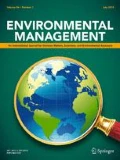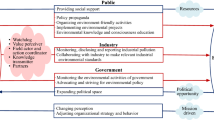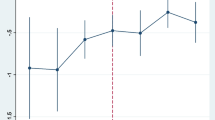Abstract
Cross-regional redeployment (or relocation) of government officials has a significant effect on the local economic development and environmental protection. Based on the panel data of 31 provinces (municipalities) in China from 2001 to 2016 and the environmental pollution index obtained by Entropy method, the dynamic panel regression model was applied to verify the relationship between the officials’ cross-regional redeployment and environmental pollution. The results show that environmental pollution was positively correlated with officials’ relocation and their tenure after the redeployment. As the officials’ tenure increases to the critical value, the positive correlation between the official’s tenure and environmental pollution would change. By measuring this threshold, we find that the average critical value for China was 5.14 years, which were the same as the average tenure of Chinese officials. Moreover, the result also illustrates the difference between central eastern China and western China, with the average threshold being 4.01 years and 5.89 years, respectively. In addition, the impact of officials’ cross-regional redeployment on the environment would also be affected by the initial condition of the region. According to the result, the environmental governance within the central eastern regions was better than that in the western region. In the last part of this paper, we proposed measures and suggestions, such as changing the incentive policies of officials, perfecting the local policies and the cultivate and exchange system of cadres, as well as strengthen the power of social supervision, for the sake of facilitating the healthy and green development of the regional economy.
Highlights
-
We examined the significant effects of the relationship between the officials’ cross-regional redeployment and environmental pollution.
-
We found that environmental pollution was positively correlated with officials’ relocation and their tenure after the redeployment.
-
We found that the average critical value for China was 5.14 years, which were the same as the average tenure of Chinese officials.
-
The impact of officials’ cross-regional redeployment on the environment would also be affected by the initial condition of the region.
-
We proposed measures and suggestions for facilitating the healthy and green development of the regional economy.
Similar content being viewed by others
References
Bellettini G, Ceroni BC, Prarolo G (2013) Persistence of politicians and firms’ innovation. Economic Inq 51(4):2056–2070
Cai F, Du Y, Wang MY (2008) Transformation of economic development mode and internal drive for energy conservation and emission reduction. Econ Res J 43(06), 4–11, 36
Chen G, Li S (2012) Official exchanges, tenure and anti-corruption. World Econ 35(02):120–142
Chen JX (2018) Institutional analysis of local officials’ performance incentives. Pol Sci Res 3(03):72–80, 128
Chen YY, Luo DL (2012) Local official turnover and corporate investment. Economic Res J 47(S2):18–30
Chien S-S, Hong D (2018) River leaders in China: party-state hierarchy and transboundary governance. Political Geogr 62:58–67
Cole AM, Elliott JRR, Zhang J (2009) Corruption, governance and FDI location in China: A Province-Level Analysis. J Dev Stud 45(9):1494–1512
Datta A (2012) India’s ecocity? Environment, urbanization, and mobility in the making of Lavasa. Environ Plan C: Gov Pol 30(6):982–996
Ding CM, Liu M, Liang YJ (2015) Officials turnover and investment in transportation infrastructure. J Financ Econ 41(04):90–99
Fredriksson GP, Svensson J (2003) Political instability, corruption and policy formation: the case of environmental policy. J Public Econ 87(7):1383–1405
Fu Y (2008) Why decentralization is different in China: an analytic framework considering political incentives and fiscal incentives. World Econ 31(11):16–25
Gan CH, Zou J, Wang J (2015). Local officials’ tenure, corporate resource acquisition and overcapacity. China Industrial Economy 32(03):44–56
Geng S, Pang BQ, Zhong LN (2016) The tenure of Chinese local leaders and the model of government behavior: political economy of officials’ term. Econ (Q) 15(03):893–916
Grossman GM, Krueger AB (1995) Economic growth and the environment. Q J Econ 110(2):353–377
Guo F, Shi QL (2017) Official turnover, collusion and temporary improvement of air quality. Economic Res J 52(07):155–168
He S, Li HJ (2014) Does the rotation of local officials have an “extrusion” effect on corporate R&D investment? Indust Econ Res 13(04):30–40
He W, Guo SL, Liu CY (2017) Statistical test on the effect of official performance evaluation on environmental governance. Statist Decis 4:107–109
Horowitz S, Hoff K, Milanovic B (2009) Government turnover: concepts, measures and applications. Eur J Political Res 48(1):107–129
Hou XX, Chen Q, Zheng TD (2018) Re-testing the relationship between fiscal decentralization and environmental quality: based on the perspective of government preference change. Financ Trade Res 29(06):87–98
Howes M, Wortley L, Potts R, Dedekorkut-Howes A, Serrao-Neumann S, Davidson J, Smith T, Nunn P (2017) Environmental sustainability: a case of policy implementation failure? Sustainability 9(2):165
Jiang DQ, Jiang GH, Chen DH (2015) Promotion of local officials and economic efficiency: an empirical study based on the view of performance assessment and the heterogeneity of officials. China Ind Econ 10:21–36
Keen M, Marchand M (1997) Fiscal competition and the pattern of public spending. J Public Econ 66(1):33–53
Li H, Zhou LA (2005) Political turnover and economic performance: the incentive role of personnel control in China. J Public Econ 89(9-10):1743–1762
Li X, Yang X, Wei Q, Zhang B (2019) Authoritarian environmentalism and environmental policy implementation in China. Resour, Conserv Recycling 145:86–93
Liang PH, Gao N (2014) Personnel change, legal environment and local environmental pollution. Manage World 30(06):65–78
Lin B, Benjamin NI (2017) Green development determinants in China: a non-radial quantile outlook. J Clean Prod 162:764–775
Liu S, Gu NH (2017) Governance of officials, foreign direct investment and regional environmental pollution: based on officials’ incentives and its heterogeneity. Economic Syst Reform 02:24–30
Ma L (2013) Official promotion incentives and government performance target setting: an empirical study of Chinese provincial panel data. J Public Adm 10(02):28–39, 138
Nie HH (2013) Government-enterprise collusion and economic growth: reflections on the “China Model”. China Renmin University Press: Beijing, China
Persson P, Zhuravskaya EV (2012) Elite influence as a substitute for local democracy: evidence from backgrounds of Chinese provincial leaders. SSRN Electron J. Aug. https://doi.org/10.2139/ssrn.1506709
Pi JC, Yin J, Zhou Y (2014) Research on the governance effect of local officials in China under the new situation. Economic Res J 49(10):89–101
Qian Y, Roland G (1998) Federalism and the soft budget constraint. Am Economic Rev 88(5):1143–1162
Sigman H (2004) Transboundary spillovers and decentralization of environmental policies. J Environ Econ Manag 50(1):82–101
Stiglitz JE (2000) Formal and informal institutions. In: Social capital: a multifaceted perspective, (Eds Dasgupta P & Serageldin I). World Bank Publications. pp 59–68. https://www8.gsb.columbia.edu/faculty/jstiglitz/sites/jstiglitz/files/Formal%20and%20Informal%20Institutions.pdf
Sun WZ, Luo DL, Zheng SQ (2014) Environmental assessment, promotion of local officials and environmental governance. J Tsinghua Univ (Philos Soc Sci) 29(04):49–62, 171
Tan ZX, Zhang YY, Fu J (2018) The power of expectation: will promotion lead to environmental pollution?: an empirical study based on instrumental variable method. J Indust Eng Eng Manage [2018-08-14], 1–9. https://doi.org/10.13587/j.cnki.jieem.2018.04.005
UN (The United Nations). Transforming our World: the 2030 Agenda for Sustainable Development. 2015. http://www.un.org. Accessed 10 November 2018
UNFCCC (United Nations Framework Convention on Climate Change). The Paris Agreement. 2015. http://www.un.org. Accessed 10 November 2018
Walder AG (1995) Local governments as industrial firms: an organizational analysis of China’s transitional economy. Am J Sociol 101(2):263–301
Wang H, Di W (2002) The determinants of government environmental performance: an empirical analysis of Chinese townships. Policy Research Working Paper 704–708
Wang J, Zhang KZ (2014) Fiscal decentralization, local officials and carbon emissions. Mod Financ Econ-J Tianjin Univ Financ Econ 34(09):3–14
Wang XB, Xu XX, Li X (2009) Local official turnover and economic growth. China Economic Q 8(04):1301–1328
Wu PC, Wang Z (2016) The effect of officials’ turnover on urban environmental pollution. Urban Prob 250(05):74–81
Wu YP (2008) Fiscal decentralization, corruption and governance. Econ (Q) 7(03):1045–1060
Xu YK, Qian XH, Li WA (2013) Political uncertainty, political connections and private enterprise investment: evidence from the replacement of secretary of the municipal party committee. Manage World 29(05):116–130
Xue B, Mitchell B, Geng Y, Ren W, Müller K, Ma Z, P. de Oliveira JA, Fujita T, Tobias M (2014) A review on China’s pollutant emissions reduction assessment. Ecol Indic 38:272–278
Yang HS, Cai GW, Li ZB (2015) Policy discontinuity and financial efficiency loss: empirical evidence from rotation of local officials. Manage World 31(12):12–23, 187
Yang HS, Luo DL, Chen SL (2010) Resource endowment, official communication and economic growth. Manage World 26(05):17–26
Yu XP (2016) Promotion tournament of officials: the political logic of economic growth, based on the sorting and analysis of relevant literature. East China Econ Manag 30(06):88–95
Yu WC, He QY (2013) Economic growth performance and environmental pollution accidents: based on the perspective of officials’ political achievements. World Econ Pap 1(02):20–35
Zhang J, Gao Y (2007) Tenure of officials, cross-regional exchanges and economic growth. Econ Res J 42(11):91–103
Zhang N, Lu HY (2016) Vertical communication of officials and environmental governance: evidence from municipal committee secretaries (mayors) of 109 cities in China. J Public Manag 13(01):31–43, 153–154
Zhang SL (2010) Discussion on the strategy of promoting the construction of CPC’s cadre communication system. Study Pract 2:47–55
Zhang Zl, Zhao Wj (2018) Research on financial pressure, poverty governance, and environmental pollution in China. Sustainability 10(6):1834
Zheng SQ, Wan GH, Sun WZ, Luo DL (2013) Public appeal and urban environmental governance. Manage World 29(06):72–84
Zhou LA (2004) Incentives and cooperation of government officials in promotion game: the reasons for the long-term problems of local protectionism and redundant construction in China. Econ Res J 39(06):33–40
Zhou LA (2007) Research on the promotion tournament model of Chinese local officials. Econ Res J 42(07):36–50
Zhu PF, Zhang ZY, Jiang GL (2011) FDI and environmental regulation: an empirical study based on local decentralization. Economic Res J 46(06):133–145
Acknowledgements
This research was funded by the Chongqing Social Sciences Planning (2017ZDYY33), Natural Science Foundation of China (41471116), Natural Science Foundation of Guangdong Province (2016A030313547), and special thanks go to the Youth Innovation Promotion Association CAS (2016181).
Author information
Authors and Affiliations
Corresponding author
Ethics declarations
Conflict of Interest
The authors declare that they have no conflict of interest.
Additional information
Publisher’s note Springer Nature remains neutral with regard to jurisdictional claims in published maps and institutional affiliations.
Rights and permissions
About this article
Cite this article
Zhou, B., Li, Y., Lu, X. et al. Effects of Officials’ Cross-Regional Redeployment on Regional Environmental Quality in China. Environmental Management 64, 757–771 (2019). https://doi.org/10.1007/s00267-019-01216-0
Received:
Accepted:
Published:
Issue Date:
DOI: https://doi.org/10.1007/s00267-019-01216-0




